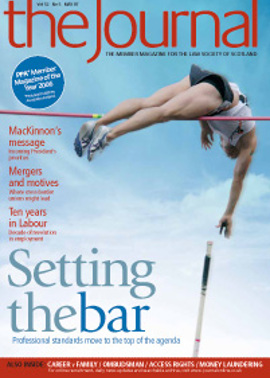Technical but essential

Citation through agents
In Comhairle Nan Eilean Siar v Collins 2007 GWD 11-203, one of the issues considered in an appeal against the refusal of a reponing note was whether there had actually been proper citation of the defender. The initial writ had been served by recorded delivery to his solicitor’s place of business. These solicitors had been authorised to accept service. Notwithstanding this, no docquet of acceptance of service was endorsed on the principal initial writ. Accordingly there had been no proper service upon the defender. The endorsation of such a docquet by the solicitors was essential if service was accepted by solicitors on behalf of their client. The purported service did not conform to the terms of s 3 of the Citation Amendment (Scotland) Act 1882, which required citation at a defender’s place of residence or business. This point may appear technical, but these technical matters can on occasion result in decrees in absence being refused, or if granted, subject to being reponed, causing much frustration of agents and parties!
Diligence on the dependence
In F G Hawkes (Western) Ltd v Szipt Ltd [2007] CSOH 57, the issue was whether diligence executed on the dependence could remain in force in light of the defence lodged. A good arguable case as disclosed in a writ may be weakened when defences are lodged. Lord Emslie considered that before a defence weakened the claim sufficiently that it was no longer appropriate for the diligence on the dependence to remain in force, the defence had to be sufficiently substantial that it weakened the prima facie claim. This was a question of fact and degree, and vouching and documentary evidence could be considered for that purpose.
Summary decree
In Slessor v Vetco Gray UK Ltd [2007] CSOH 59 the decision of Lady Paton represents an example of a motion for summary decree not being used to deliver a knockout blow, but rather to dispose of issues that had no prospect of success. The motion was successful, thus restricting issues to contributory negligence, potential third party liability, and quantum. This selective approach is sometimes forgotten.
Remit to the sheriff court
In R v Highland Council [2007] CSOH 51; 2007 GWD 9-158 Lord Uist refused a motion to remit an action for reparation to the sheriff court. The action involved novel and difficult questions of law, including those relating to the public and common law duties incumbent on the defenders, the retrospective operation of the Human Rights Act 1998, and the defenders’ duties in respect of the pursuer’s practice of religion. The reason for the motion appeared to be at least in part that legal aid had not been granted for proceedings in the Court of Session but rather in the sheriff court. Lord Uist refused the motion. In light of the issues raised the Court of Session was clearly the appropriate forum. Entitlement to legal aid and a party’s personal circumstances were not factors to be considered under the phrase “nature of the action” in s 14 of the Law Reform (Miscellaneous Provisions) (Scotland) Act 1985.
Lord Uist observed that the decision of the Scottish Legal Aid Board seemed somewhat perverse when the issues raised were clearly novel and complex. Would I be mistaken in imagining that the Board’s decision here suggests that there are certain formulae which are slavishly followed when applications for legal aid are considered? If the formula is satisfied, legal aid is granted; if not…!
Appeals in family cases
Really as a postscript to an appeal in respect of inter alia residence and contact, the Inner House reiterated in Stewart v Stewart, 23 March 2007 that in most cases more was achieved by lodging a minute for variation of an order than appealing a decision on these issues.
Certification of experts
The decision of Lord Glennie in O’Donnell v MacLean [2007] CSOH 62 is a sequel to an earlier decision in which his Lordship refused to allow a late list of witnesses insofar as it related to certain expert witnesses of the pursuer. The subject matter of the present motion was one seeking certification of certain persons as experts, including the experts detailed on the notice which was not allowed to be lodged late. Lord Glennie decided that if a person had been refused to be allowed to be a witness, it was impossible for the court to certify that person as an expert witness. The present situation was quite different from one in which an expert witness was not called to give evidence for whatever reason. The fact that the expert in question might have been of assistance to the party seeking certification was irrelevant. The issue was whether it was reasonable to instruct the person as an expert witness.In Grant v Grant, 13 March 2007 Sheriff Pyle observed when dealing with a motion for uplift that the purpose of the motion was to reward solicitors for special responsibilities imposed on that person in the conduct of the litigation.
The usual caveat applies.
In this issue
- Block fees: the story behind the changes
- Strategic advance
- Court plans with little appeal
- Under commission
- Two into one can go
- Ten years of labour
- Career v Family
- Monitor - at your own risk
- Raising the standard
- Society shapes the changes
- Society shapes the changes (1)
- Money laundering to change again
- Border and Immigration Agency launches
- Dealing positively with client concerns
- From the Brussels office
- Winning ways
- Toothless against spam?
- Risk reinvented
- Technical but essential
- Pension sharing tips on divorce
- In pursuit of simplicity
- In pursuit of simplicity (1)
- First in the class
- Scottish Solicitors' Discipline Tribunal
- Website reviews
- Book reviews
- On the road
- Access or excess?
- Alterations are no 2 problem
- ARTL: upgrade now for security






